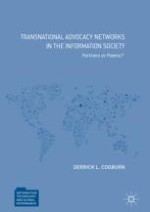2017 | OriginalPaper | Buchkapitel
5. World Summit on the Information Society: Catalyst for Transnational Advocacy and a Milestone for Multistakeholder Global Governance
verfasst von : Derrick L. Cogburn
Erschienen in: Transnational Advocacy Networks in the Information Society
Verlag: Palgrave Macmillan US
Aktivieren Sie unsere intelligente Suche, um passende Fachinhalte oder Patente zu finden.
Wählen Sie Textabschnitte aus um mit Künstlicher Intelligenz passenden Patente zu finden. powered by
Markieren Sie Textabschnitte, um KI-gestützt weitere passende Inhalte zu finden. powered by
